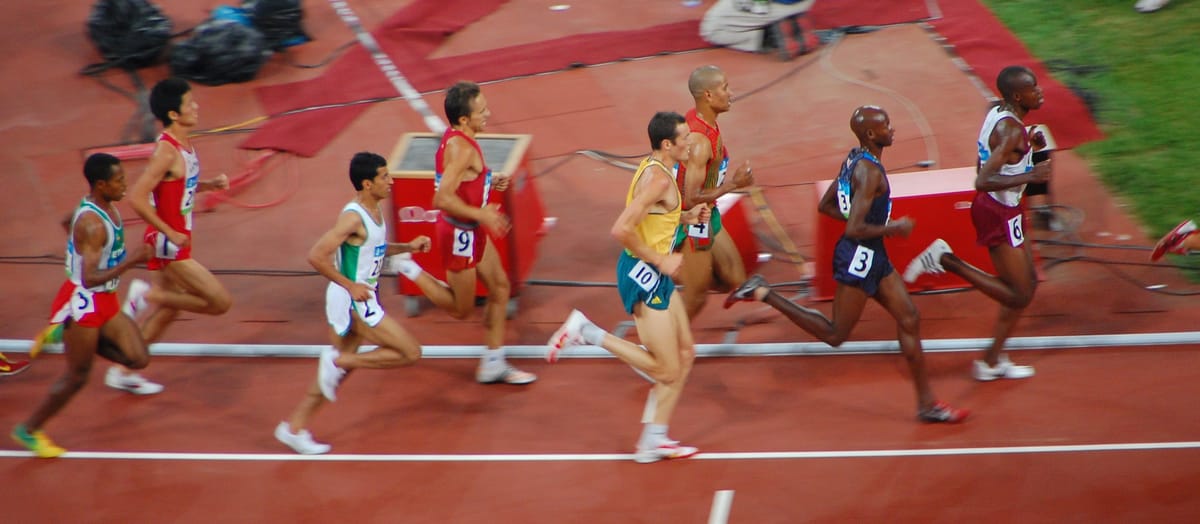The Olympics are just around the corner, and like any sports fan, I get swept up in the thrill of an athlete attempting to set a new world record. Perhaps there’s no better platform to witness new sporting heights than the Olympic Games, where the entire motto — faster, higher, stronger — is about surpassing old limits.
But in the era of climate change, we should add one more sobering adjective to this motto: warmer. It’s more realistic than aspirational, to be sure, but still record-setting. And heat has the potential to outmuscle the other metrics, seeing that this year’s Olympic Games will be the hottest on record. (The gold medal in this race to this hellish bottom is currently held by 2021’s summer games held in Tokyo. But this Paris Games is all but poised to dethrone its predecessor.) These rising temperatures may be the only records broken this summer, since they’re whittling athletes’ chances of making history on the Olympic stage.
It’s true that records are highly context-dependent. Setting a new one isn’t just about a person’s singular talent or hard work. It also takes a syzygy of good circumstances and good luck.
At the 1968 Olympics in Mexico City, the world saw American long jumper Bob Beamon leap his way into the history books with a mighty vault of 29 feet and 2¼ inches, obliterating the existing world record by nearly two feet. Analysts point to the thinner-than-usual air that comes with an altitude of 7,520 feet and significant, barely-legal tailwind for helping Beamon fly through the air. It’s hard to say how much the competition venue contributed to Beamon landing this feat. Mike Powell, another American, shattered Beamon’s accomplishment in 1991 at the Tokyo World Championships under less fortuitous conditions. But I’m sure any would-be record-breaker would take whatever boost they could get.
These days, breaking a sporting world record is more often a poke than a smash. New bests come into fruition by the smallest advances off the current milestone — for example, the last world record for the men’s half marathon, a race time of 57 minutes and 32 seconds, was broken in 2021 by just a second. Now, climate change is adding chaos to all that.
These days, breaking a sporting world record is more often a poke than a smash.
In theory, the rising temperatures could produce small gains. Air density drops with temperature, so one could posit that any sport whose biggest nemesis is air resistance could benefit marginally. There’s even some evidence showing that certain spectator sports may be getting more exciting because of climate change. One 2023 study found that rising temperatures could lead to more home runs in baseball, because the drag acting on the ball would be smaller. For every 1 °C (or 2.8 °F) increase, the chances of a fly ball converting into a home run increased by 2%. What that could look like in practice is that 95 additional home runs would be made in each season with each temperature increase of 1 °C.
The sports that would reap the biggest gains from hotter temperatures would be those that involve speed, such as javelin throwing (up to 70 mph) or discus (as fast as 45 mph). Humans themselves don’t move fast enough to notice the air resistance drop from the thinner air. Jumps or race events will probably be unaffected. The only way for temperatures to measurably impact performance in these athletic feats would be if temperatures rose to an insanely high degree — for example, to match the air density at Mexico City’s 7500 feet you would need, at sea level… around 160 °F. By that point, we’d have more to concern ourselves with than the next long-jump or sprinting record.
Warming temperatures, for the most part, will have a very straightforward effect on athletic performance: it’s hard to bring one’s A-game in the heat. If you've ever exerted yourself on a blisteringly hot and humid day, you’ve probably felt more sluggish than usual. That’s your body signaling for you to slow down as it juggles competing priorities of cooling itself and delivering oxygen to its muscles. Having only so much blood to work with, the heart needs to pump doubly hard to meet both needs. I’m based in Washington, D.C., where the summers are brutally humid. The thought of running outside, right now, in typical 90-degrees conditions, raises my hackles. This is the kind of weather that’s expected at the 2024 Paris Olympics.
There are measures that athletes can take to mitigate heat’s effects. For starters, they can pre-acclimate their bodies by working out in warm weather before the big day. But as adaptable as the body is, races are won and new records are set with razor thin margins — unpredictable weather and high temperatures can put lofty goals out of reach. There’s only so much that athletes can do to prepare. Not to mention, pushing the body under the heat can be hazardous — it can lead to cramps, heat exhaustion, or heat stroke. The consequences of over-exertion can be fatal.
In outdoor endurance events, participants should hope for colder temperatures as a rule of thumb. The marathon is perhaps the most salient illustration of how individual performances are at mercy of the weather. Notably, many of the records were broken outside the Olympics and instead during other world meets that take place outside summer. A survey of 60 major world marathons showed that participants notched the highest speeds on average when temperatures sat between 40 and 50 °F. Another study reported that elite athletes can expect to add anywhere between 2.5 and 13 minutes to their running time when temperatures jump from a chilly 50 °F to a balmy 77 °F. Even heat-acclimated individuals still perform better when race day is colder than the conditions they had initially prepared for.
Outdoor events are obviously the most impacted by heat, but even athletes who are competing indoors may see their performances drop in subtle ways. Everyone is going to be exposed to the elements at some point, during commutes between venues or downtime before an event. Athletes will have to pay attention to their hydration throughout it all to escape unscathed. If they’re not sleeping well on a warmer-than-usual night, their mood and mental acuity will take a hit the next day.
Heat affects everybody, so if there’s one small consolation, it’s that athletes gunning for gold just have to make sure they fare better than their rivals in an universally hostile environment.
If athletes have slower reaction time and make more tactical errors, it won’t just impact their record-setting abilities. Their sluggishness will also make high-stakes team events and individual competitions less thrilling for viewers at home. How much would you like to watch a matchup that boils down to who suffers the least among a pool of heat-challenged individuals? Let’s also acknowledge the slog of referees running around under the hot sun just to do their jobs, and how that stress can impact the outcome of a game. A study among 12 soccer referees found that they were moderately dehydrated after their matches — before you ask, drinking up during their matches failed to make up for the water they had lost through sweat. Just like any heat-stressed athlete, they too might be prone to making bad calls.
Heat affects everybody, so if there’s one small consolation, it’s that athletes gunning for gold just have to make sure they fare better than their rivals in an universally hostile environment. But it would mean the death of the all-time world record. We’ll only be able to judge human excellence against one day’s competitive field than the greats from the pages of history books. I can’t help but find that prospect sad.
Records being broken, again and again, reflect humanity’s never-ending growth. The lack of new mile markers would feel like humanity has all but stagnated — it confirms that our environmental sins have finally caught up with us and put a glass ceiling over what we can do. With excellence being too high of a bar to clear, the goal of our species then will simply be to survive.




